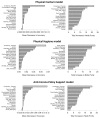Retrospective Analysis of the Psychological Predictors of Public Health Support in Bulgarians at the Beginning of the Coronavirus Pandemic
- PMID: 37239293
- PMCID: PMC10216045
- DOI: 10.3390/brainsci13050821
Retrospective Analysis of the Psychological Predictors of Public Health Support in Bulgarians at the Beginning of the Coronavirus Pandemic
Abstract
The earliest critical context of the pandemic, preceding the first real epidemiological wave of contagion in Bulgaria, was examined using a socio-affective perspective. A retrospective and agnostic analytical approach was adopted. Our goal was to identify traits and trends that explain public health support (PHS) of Bulgarians during the first two months of the declared state of emergency. We investigated a set of variables with a unified method within an international scientific network named the International Collaboration on Social & Moral Psychology of COVID-19 (ICSMP) in April and May 2020. A total of 733 Bulgarians participated in the study (67.3% females), with an average age of 31.8 years (SD = 11.66). Conspiracy Theories Beliefs were a significant predictor of lower PHS. Psychological Well-Being was significantly associated with Physical Contact and Anti-Corona Policy Support. Physical Contact was significantly predicted by fewer Conspiracy Theories Beliefs, higher Collective Narcissism, Open-mindedness, higher Trait Self-Control, Moral Identity, Risk Perception and Psychological Well-Being. Physical Hygiene compliance was predicted by fewer Conspiracy Theories Beliefs, Collective Narcissism, Morality-as-Cooperation, Moral Identity and Psychological Well-Being. The results revealed two polar trends of support and non-support of public health policies. The contribution of this study is in providing evidence for the affective polarization and phenomenology of (non)precarity during the outbreak of the pandemic.
Keywords: affective polarization; conspiracy theories beliefs; ontological uncertainty; precarity; psychological predictors; psychological well-being; public health support.
Conflict of interest statement
The authors declare no conflict of interest. The funders had no role in the design of the study; in the collection, analyses or interpretation of data; in the writing of the manuscript; or in the decision to publish the results.
Figures

References
-
- Eva J., Fritsche I. Destined to die but not to wage war: How existential threat can contribute to escalation or de-escalation of violent intergroup conflict. Am. Psychol. 2013;68:543. - PubMed
-
- Catarina K., Mitzen J. Anxiety, fear, and ontological security in world politics: Thinking with and beyond Giddens. Int. Theory. 2020;12:240–256.
-
- Laing R.D. The Divided Self: An Existential Study in Sanity and Madness. Penguin Books; London, UK: 1960.
LinkOut - more resources
Full Text Sources
Miscellaneous

